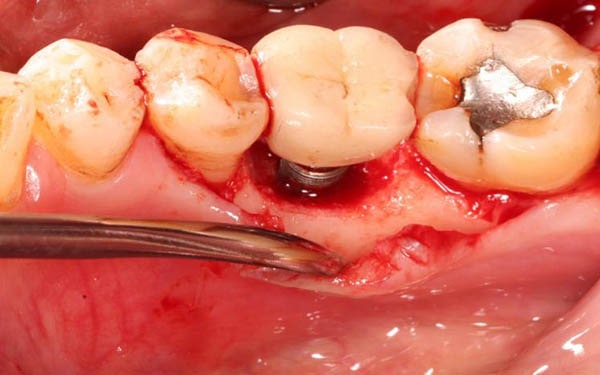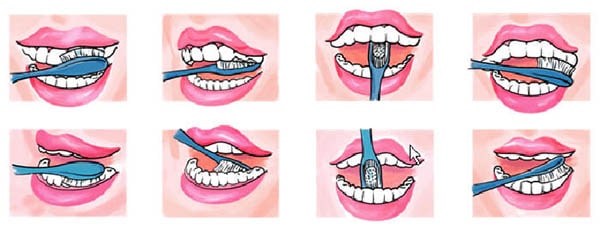Things to know about swelling after Dental Implant
In fact, the swelling of the implant is a manifestation of the damage of gum tissues and jawbone during the recovery after surgery. However, prolonged swelling might be a result of infection, rejected Implant, or nerve damage. To overcome the welling after Dental Implant, you can apply methods such as cold compresses, medication and proper oral hygiene.
Contents
Why is swelling after Dental Implant?
After the implant is placed, or more precisely, after the post is inserted into the jawbone, your face will be swollen within the first few days as a result of the invasive surgery.
In fact, this is just a very normal response of the body to injury. Simply put, swelling is just the accumulation of fluid in the tissues when the epidermis is damaged.
Meanwhile, when performing the Implant surgery, the dentist will make an incision in the gums and open the jawbone, so reactions such as swelling and pain during the healing process will be inevitable.
However, if the swelling lasts for a long time, it is associated with other causes such as infection, Implant rejection, edema, etc.
Inflamed Implant teeth
Inflamed Implant teeth are one of the extremely serious complications after Dental Implant. This occurs due to various reasons such as poor postoperative care or surgical instruments that are not aseptic.
At that time, your face is not only severely swollen, but is also accompanied by severe pain, festering, bad smell, …
Rejected Implant teeth
To put it simply, this is the failure of the implant and jawbone integration. The non-integrated Implant post will not be guaranteed for stability and certainty. As a result, the chewing function of the denture will be directly affected.
Accordingly, the rejection of the Implant is also one of the causes of painful swelling that lasts for many days.
Nerves and gum tissues damage
As mentioned, during the Dental Implant procedure, the dentist will make an incision in the gums and open the bone to easily insert the post into the jawbone.
If the doctor performs the technique wrong, drills too deeply or manipulates too hard, it will seriously damage the nerves and surrounding tissues, causing swelling and pain.
Nerve damage also makes the face numb and cause loss of sensation in the lips and cheeks. This is one of the complex complications of Dental Implants and the treatment is not easy.

Edema
Edema occurs when an excessive volume of fluid accumulates in the tissues and can negatively affect the recovery process, causing discomfort when eating and maintaining oral hygiene.
When the accumulation of plasma cells is too large, it will make the wound seriously swell. Even the outer face will also be swollen.
Incompletely treated infection
If the surgical area is infected before placing the implant, and the infectious agents aren’t properly treated, the gums and face will certainly be swollen for a long time.
Moreover, this is also one of the reasons why the implant post is rejected immediately after the Dental Implant process.
How many days will the Implant be swollen?
According to Doctor Nguyễn Anh Ngọc, after the Implant procedure, if you take good care of your health, the swelling will gradually decrease in 4-7 days. This time may vary depending on the health status of each person.
One of the very simple signs that the wound is healing is that the swollen gums gradually turn purple and yellow. On the contrary, if the implant area is always bruised, almost darkening, you need to immediately inform your dentist, as this is a warning for dangerous complications.
How to effectively reduce swelling?
If you know how to take care of it properly and appropriately, swelling after Implant is not really a problem to worry about. To reduce swelling and pain quickly, you should apply cold compresses, take prescription medicines, take care of your teeth properly,…
Cold compress
Cold compress is always a useful solution to swelling and pain after surgery.
In the first 2-3 days after Dental Implant, you should apply cold compress to overcome swelling and discomfort.
You just need to take a few ice cubes and wrap them in a bag or clean cloth and gently apply the pack to the swollen area for 10 minutes. Repeat this 2-3 times a day after 4-6 hours.
Do not apply ice directly to the skin or press firmly onto the swollen area to avoid cold burns, more swelling and severe pain.

Within the next few days, you should switch to hot compress to heal bruises and help to improve blood circulation to the surgical area so that the wound can heal quickly.
Take prescription medicine
Dentists often prescribe pain-relieving, anti-edematous, anti-inflammatory drugs after Implant surgery. Therefore, you should follow the doctor’s prescription.
Do not change the dosage, type of medication or use drugs without consulting your doctor. Chances are those changes will make you face the risk of longer-healing wounds as well as unwanted side effects of the drug.
Proper dental care
The way you take care of your teeth will determine the speed of healing after your Implant. So of course, it also has a decisive impact on the swelling or pain.
- During the first day after Implant surgery, you should not brush your teeth, rinse your mouth with salt water or spit too hard.
- From the second day, you can brush your teeth gently. However, if you still feel pain, you should only use salt water to help deal with inflammation and reduce swelling effectively.
- When brushing teeth, avoid brushing directly into the surgical area.
- It is recommended to use more dental floss to remove plaque around the Implant position as well as between the teeth.
Suitable diet
Your daily diet will also determine whether the swelling after Implant will heal quickly or not. Besides, if you choose inappropriate foods, the risk of the implant being rejected will increase. Below are the dos and don’ts in your diet.
Dos:
- Eat soft, liquid foods like soup, porridge for the first week or two.
- Eat cold foods such as yogurt, smoothies… as they can also somewhat reduce swelling.
- Add more foods that are rich in fiber, vitamin C, vitamin D,… to help speed up the recovery process.
- Abstain from hard, chewy, crunchy foods for the first 1-2 weeks to prevent tearing of the wound and irritation of the implant post below.
Don’s:
- Do not eat too spicy, hot food in the beginning because it can irritate the wound.
- Do not use stimulants such as alcohol, tobacco as they can easily cause the implant to be rejected and infection complications to occur.
Rest and avoid vigorous physical activity
Trying to stay calm, rest and relax for the first few days helps to reduce swelling after implantation.
Besides, you should not exercise vigorously because it makes the body tired and can lead to more swelling and pain.
Although swollen Implant is a normal reaction of the body, we should not be subjective, especially when the situation is prolonged. Therefore, please pay attention to health care after Dental Implant surgery so that swelling can quickly reduce as well as accelerate the healing process. If swelling persists for several days with other unusual symptoms, contact your doctor immediately.

